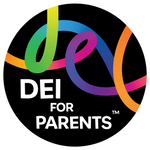
If you’re a parent, you’ve probably experienced The Moment.
You know—the one where your child innocently asks a question so unexpectedly big, so socially complex, so cosmically adult that your brain immediately performs a hard reboot.
- “Why did that kid get teased for having two moms?”
- “Why can’t everyone be treated the same?”
- “Why did that man say that mean thing?”
And there you are, standing in the produce aisle holding a cucumber like it’s a microphone you never wanted, thinking: “What should I say?”
